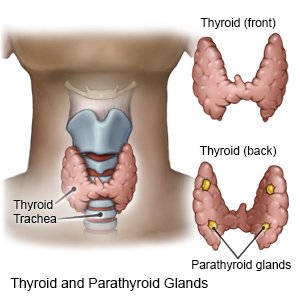Partial Thyroidectomy
Medically reviewed by Drugs.com. Last updated on Sep 23, 2025.
What do I need to know about a partial thyroidectomy?
A partial thyroidectomy is surgery to remove part of your thyroid gland. This surgery is also called a hemithyroidectomy.
 |
How do I prepare for a partial thyroidectomy?
- Your surgeon will tell you how to prepare. You may be told not to eat or drink anything after midnight on the day of surgery. Arrange to have someone drive you home when you are discharged.
- Tell your surgeon about all medicines you currently take. Your surgeon will tell you if you need to stop any medicine for the surgery, and when to stop. Your surgeon will tell you which medicines to take or not take on the day of surgery.
- Tell your surgeon about any allergies you have, including to anesthesia or medicines. You may be given antithyroid medicine to lower the amount of thyroid hormone made by your thyroid gland.
- You may need blood tests before your surgery to check the amounts of calcium and thyroid hormone in your blood. You may also need ultrasound, CT, or MRI pictures of your thyroid. This will help your surgeon plan your surgery.
Related medications
What will happen during a partial thyroidectomy?
- You will be given general anesthesia to keep you asleep and free from pain during surgery. Your surgeon will make 1 or more incisions on your lower neck. Your surgeon will remove part of your thyroid gland. If you have cancer, your surgeon may also remove the tissue and lymph nodes around your thyroid gland.
- A drain may be placed into your incision to remove extra fluids from the surgery area. Your incision will be closed with stitches or surgical glue and covered with a bandage.
What should I expect after a partial thyroidectomy?
You will be taken to a recovery room until you are fully awake. Healthcare providers will watch you closely for problems. Do not get out of bed until your provider says it is okay. Tell providers if you have difficulty breathing or swallowing. Tell them if your bandage feels like it is getting tight. You will have blood tests to check your calcium and thyroid hormone blood levels. You may need to stay in the hospital overnight.
What are the risks of a partial thyroidectomy?
- You may bleed more than expected or develop a hematoma (pooling of blood). This may make it hard for you to breathe or swallow and needs to be treated immediately. Your vocal cords may be damaged and cause your voice to be hoarse or weak. This may become a long-term problem. You may develop a blood clot in your arm or leg. The clot may travel to your heart or brain and cause life-threatening problems, such as a heart attack or stroke.
- Your parathyroid glands may not work as well as they should after surgery. This can cause your calcium levels to drop too low. Low calcium levels can cause many problems, including an irregular heartbeat, muscle spasms, and seizures. This may be a short-term problem after surgery, or it may be a long-term problem. Your thyroid gland may not work as well after surgery. You may need to take medicine for the rest of your life to manage this.
Care Agreement
You have the right to help plan your care. Learn about your health condition and how it may be treated. Discuss treatment options with your healthcare providers to decide what care you want to receive. You always have the right to refuse treatment. The above information is an educational aid only. It is not intended as medical advice for individual conditions or treatments. Talk to your doctor, nurse or pharmacist before following any medical regimen to see if it is safe and effective for you.© Copyright Merative 2025 Information is for End User's use only and may not be sold, redistributed or otherwise used for commercial purposes.
Further information
Always consult your healthcare provider to ensure the information displayed on this page applies to your personal circumstances.
